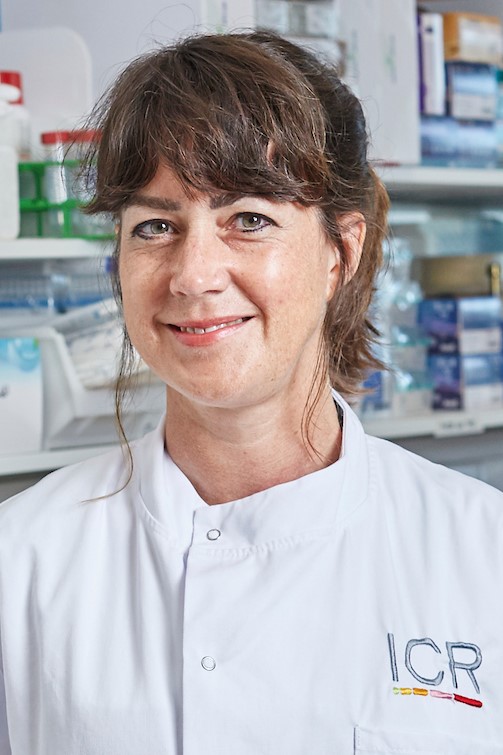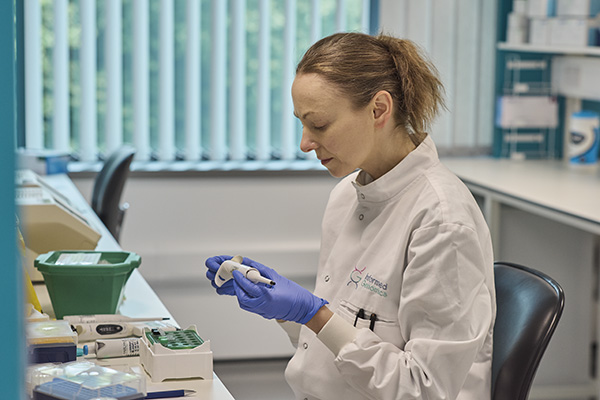Why choose our Hereditary Cancer services?
Meaningful results
Commitment to quality
End-to-end service
We can meet all your service needs, offering a modular service that allows us to tailor our service modules to you. We offer sample collection, DNA extraction, sequencing, secondary and tertiary analysis of approved genes (see Panels below), clinical reporting and genetic counselling.
UK-based laboratory
All testing, analysis and reporting is conducted at our UK-based laboratory.
Rapid turnaround time
We can deliver rapid results, in less than 20 working days of receiving the sample.
Clinical expertise
Clinical results are reviewed and reported by our expert team of HCPC-registered Clinical Scientists following national and internation best practice guidelines. Patients and clinicians are supported in understanding test results through access to genetic counselling services provided by our network of registered GCRB and AHCS counsellors.

What our customers say
"I have been very impressed with the laboratory service provided by Nonacus Clinical Services for the NHS Jewish Community BRCA testing programme. They have been highly proficient regarding the laboratory analyses and variant interpretation, as well as the logistical aspects of establishing workflows. That many have come from NHS laboratories is evident in their familiarity with our requirements. The team are professional, knowledgeable, engaged and a pleasure to work with"
Clare Turnbull MD PhD FFPH FRCP FRCPath
Professor of Cancer Genetics | Division of Genetics and Epidemiology, Institute of Cancer Research, London; NHS Consultant in Clinical Cancer Genetics (Honorary) | Royal Marsden NHS Foundation Trust; Consultant in Public Health Medicine (Honorary ) | National Disease Registration Service

Hereditary Cancer Panels
With expertly curated panels in line with current literature and national testing guidelines, all genetic variants that we report are peer-reviewed and clinically significant.
We offer a range of Hereditary Cancer Panels to study genes associated with the most common hereditary cancers which include breast, ovarian, colorectal, prostate, melanoma and pancreatic cancers. A comprehensive multi-cancer panel which includes all the cancer specific panels is also available.
The variant types* covered are
- Single nucleotide variants (SNVs)
- Small Insertion/deletion variants
- Copy number variation (CNVs)
The full gene lists for these panels are shown in the table below.
If you require bespoke genes, please get in touch to discuss your specific requirements.
| Comprehensive Hereditary Cancer Panel | APC, ATM*, BAP1, BARD1, BMPR1A, BRCA1, BRCA2, BRIP1, CDH1, CDK4, CDKN2A, CHEK2*, EPCAM*, GREM1, HOXB13, MTIF, MLH1, MSH2, MSH6, MUTYH, NF1, NTHL1, PALB2, PMS2*, POLD1, POLE, POT1, PTEN, RAD51C, RAD51D, RNF43, SMAD4, STK11, TP53, VHL |
| Hereditary Breast Cancer Panel | ATM, BARD1, BRCA1, BRCA2, CHEK2, PALB2, PTEN, RAD51C, RAD51D, STK11, TP53 |
| Hereditary Breast and Ovarian Cancer Panel | ATM, BARD1, BRCA1, BRCA2, BRIP1, CHEK2, EPCAM*, MLH1, MSH2, MSH6, PALB2, PTEN, RAD51C, RAD51D, STK11, TP53 |
| Hereditary Prostate Cancer Panel | ATM*, BRCA1, BRCA2, CHEK2*, EPCAM*, HOXB13, MLH1, MSH2, MSH6, PALB2 |
| Hereditary Colorectal Cancer (including Lynch Syndrome) Panel | APC, BMPR1A, EPCAM, GREM1, MLH1, MSH2, MSH6, MUTYH, NTHL1, PMS2, POLD1, POLE, PTEN, RNF43, SMAD4, STK11, TP53 |
| Hereditary Melanoma Cancer Panel | BAP1, BRCA2, CDK4, CDKN2A, MTIF, POT1, PTEN |
| Hereditary Pancreatic Cancer Panel | APC, ATM, BRCA1, BRCA2, CDKN2A EPCAM*, MLH1, MSH2, MSH6, PALB2, STK11, TP53, VHL |
Table 1. The genes included in each panel.
* Please contact us for more information on specific genes.
For more detail regarding gene coverage and regions of interest, contact us to discuss in more detail.
What our patients say
In November 2023, my daughter-in-law sent me a WhatsApp message linking to the NHS BRCA Screening programme stating, ‘I am getting tested, are you?
The test arrived promptly, and I sent it off in early December without a second thought. So, it was a huge shock to open the results letter in early January to find out that I had the BRCA gene mutation that could lead to several cancers, including ovarian.
How are samples sequenced?
Our Hereditary Cancer service is delivered through our Next Generation Sequencing (NGS) pipeline. We use Cell3 target enrichment and NGS to generate high-quality sequencing data.
Bioinformatic pipelines have been developed to include but not limited to detection of single nucleotide variants (SNVs), indels and copy number variants (CNVs).
To ensure high confidence in the results, key performance parameters have been determined through extensive validation of the Cell3 chemistry. Performance criteria is available upon request.
The report
The UKAS accredited clinical report provides detailed information on clinically significant findings, with information on variant interpretation, classification, impact of results and any further recommended actions.
Genetic counselling
Full genetic counselling is available for patients prior to testing to discuss appropriate gene and family history and after testing to all appropriate family members to explain test results and any associated implications, as well as onward referral and further testing where required.
Genetic counselling services are provided by our experienced network of registered GCRB and AHCS counsellors.
Research service
A larger panel incorporating >100 genes is available for research only use.